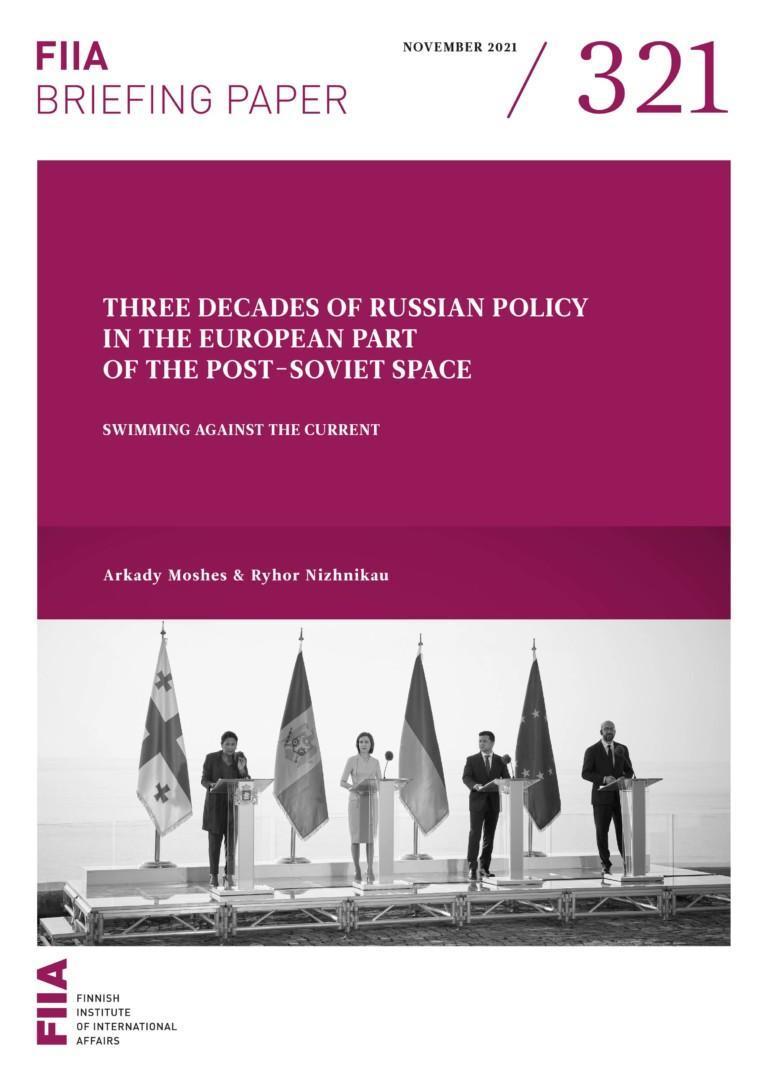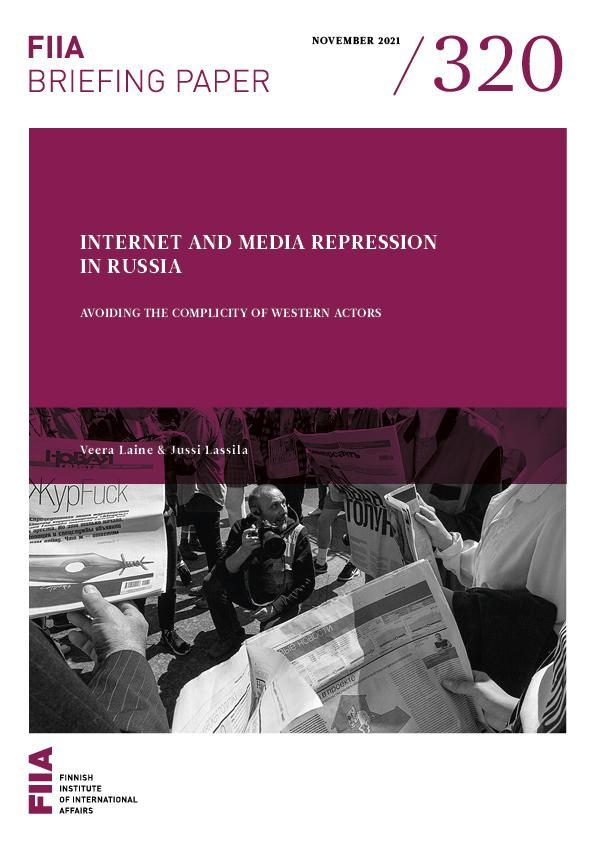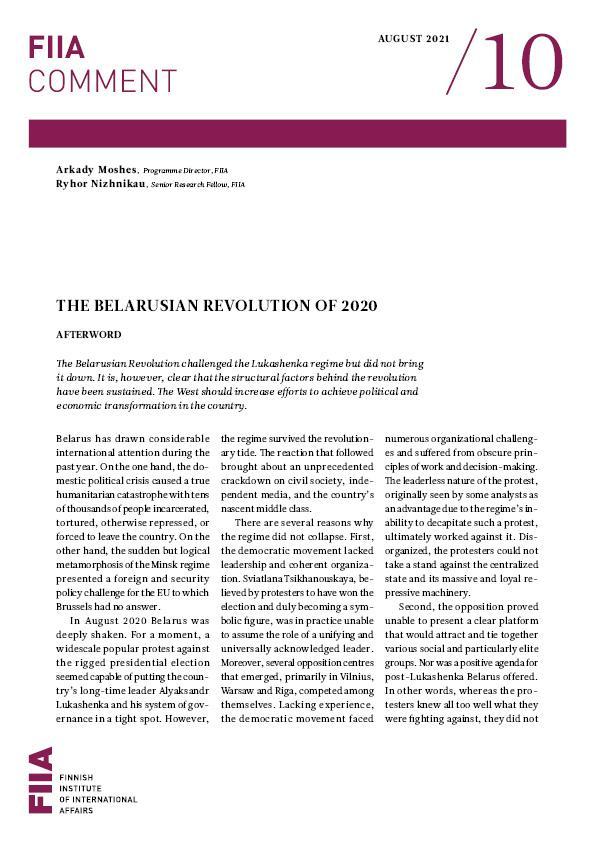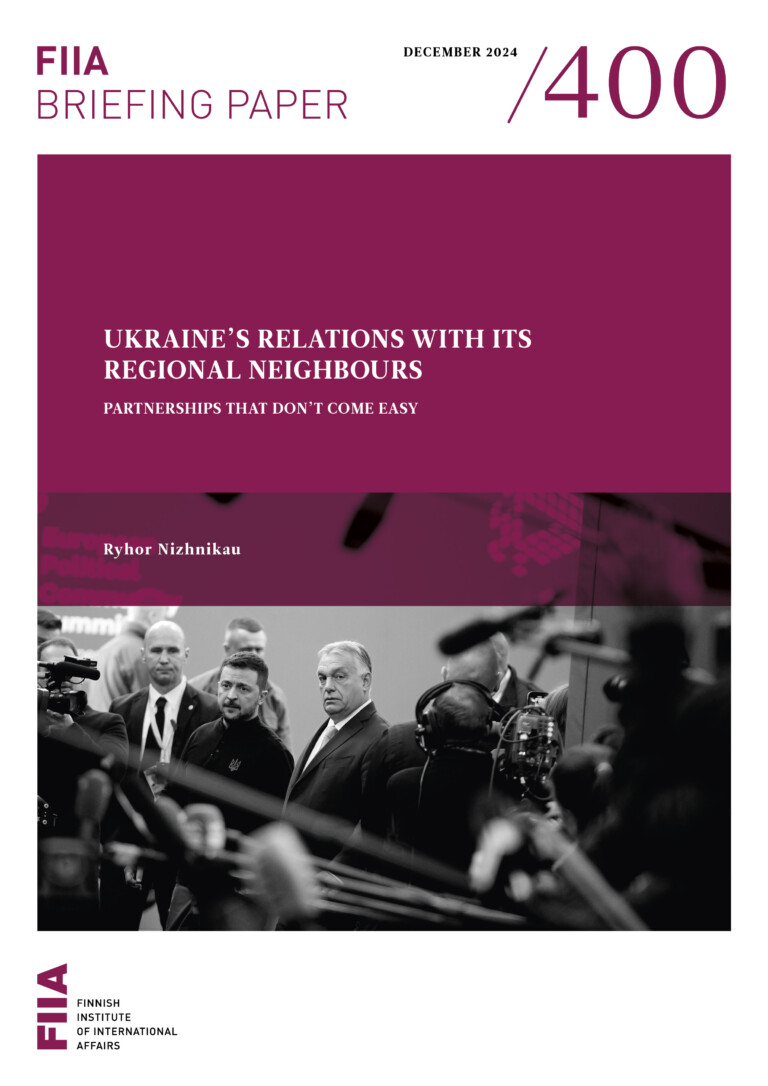The successful pursuit of Russia’s great-power status and its recognition by the West imply the preservation of pre-eminent positions, above all in the European part of the post-Soviet space.
Since Vladimir Putin’s rise to power, the Kremlin has been making a consistent effort to reverse the earlier trend towards the weakening of Russia’s regional stance. One of the implications of this policy was the shift of the Russian-Western competition in the “common neighbourhood” towards an open stand-off after Russia’s annexation of Crimea in 2014.
Russian regional policy has run counter to structural changes that could not be counter-balanced through activism, whether enticing or coercive. As a result, 30 years since the dissolution of the USSR, Russia’s regional influence as well as its attraction as a societal role model and a security provider are continuing to erode.
Russia has regional clout, which is nonetheless hardly growing over time. More and more often, Moscow is encountering difficulties in achieving its goals. While post-Soviet states resist Russia’s assertiveness, non-Western players pose new challenges to its posture.
Introduction
For 30 years, Russian foreign policy has been driven by two interconnected goals, with the pursuit of its great-power status going hand in hand with the wish to retain or re-establish hegemony in the post-Soviet space. Under the leadership of Vladimir Putin, Russia’s political and economic institutions were re-arranged, state capacities were enhanced, while the conceptual foundations of foreign policy decision-making were amended to ensure the realization of Russia’s ambitions.
However, the results have been contradictory. On the one hand, Russia indeed raised its international status. Even though its attempts to establish an alternative centre of global influence through the BRICS coalition of emerging powers (Brazil, Russia, India, China, and South Africa) and a pivot to Asia were not successful, Moscow significantly increased its capacities vis-à-vis the weakening West. Russia was able to effectively constrain Western actions in Latin America, Africa, and especially the Middle East.
On the other hand, Russia failed to restore dominance where it was most needed – in the post-Soviet space. Despite the application of all available instruments, Russia experienced further erosion of its aggregate influence in the region. The Russian-Ukrainian conflict, irreconcilable since Russia’s annexation of Crimea in 2014, gave new impetus to the trend and made post-Soviet re-integration centred around Russia totally improbable.
This Briefing Paper takes stock of Russian policy towards the European part of the post-Soviet space since the collapse of the Soviet Union. It analyses Russia’s strategy towards Armenia, Azerbaijan, Belarus, Georgia, Moldova and Ukraine, a group of countries often referred to since 2009 as EU Eastern Partnership countries, although by no means constituting a coherent political or organizational entity. The paper identifies key factors that help to explain why Russia’s regional influence is decreasing. It will be argued that Russia’s attempts to reverse processes of disintegration in the region run counter to the structural changes within these states, their elites and societies, and for this reason are unlikely to succeed.
Russia’s regional policy before 2014
The re-integration of the post-Soviet space has been a major constant in Russian foreign policy. Since the 1990s, key foreign policy documents have identified the area as a zone of Russia’s special interest. As a key regional economy, the most powerful security actor and a centre of gravity for elites and societies at large, Russia enjoyed a special status inherited from the Soviet past. Moscow could count on inertial deference towards its interests and respect for the red lines it would draw, as well as on the tacit universal understanding that an open conflict with Russia would be unaffordable for any of its regional neighbours.
Ukraine’s Orange Revolution of 2004 was the first transformative event for Russia’s regional posture. Moscow de facto lost its role of king-maker and, respectively, its veto power in the region’s domestic politics when Viktor Yushchenko became the president of Ukraine against Russia’s publicly declared preference. This demonstrated to the Kremlin that in order to pursue its regional goals it should be ready to actually use the instruments of coercion, not just hint at their existence. Moreover, a scenario of geopolitical reorientation for Ukraine, patterning itself after the Baltic states and its eventual integration with the West, had to be considered a possibility from now on. This became a thorn in Moscow’s side and augmented its sensitivities towards any Western involvement in the region.
However, since the pro-change momentum of the Orange Revolution was not sustained in Ukraine both internally and in terms of the country’s foreign policy, Russia as a whole returned to a policy more intent upon demonstrating the advantages of leaning towards it than penalizing the disobedience. In other words, as a preferred choice, loyalty was to be bought. The best example of these tactics was provided by the approach towards the regime of Alexander Lukashenko in Belarus, whose internal, economic, educational, foreign and security policies were increasing Belarus’s structural dependence on Russia year after year, and whose worldview ruled out even a hypothetical possibility of a sustainable rapprochement with the West. Despite Lukashenko’s refusal to make specific concessions sought by Moscow – let alone to agree to Belarus’ incorporation into Russia – and despite his occasional critical rhetoric towards the Kremlin, Belarus constantly received vital political and economic support, including 106 billion US dollars in direct and indirect subsidies in 2005–2015.[1] In a similar vein, in 2013 Ukraine’s President Viktor Yanukovich was promised 15 billion euros for rejecting the Association Agreement with the EU.
In the economic sphere, Russia was actively promoting institutional integration through the Eurasian Economic Community (EurAsEC), the Eurasian Customs Union, and the Eurasian Economic Union (EAEU). Moscow also fostered close sectoral cooperation and offered an expansion of the bilateral trade. In Armenia, Moldova, Belarus and Ukraine, Russia was a key foreign investor, massively acquiring banking, industrial, telecommunication and energy assets.
Russia’s strategies focused on the cooptation of local elites. Shared political and social norms, stemming from the same source – be it the Soviet bureaucracy or organized crime groups – facilitated the task. Corruption was one natural mechanism of cooptation. For instance, a scheme known as the Russian Laundromat, involving a Moldovan oligarch with Russian connections called Ilan Shor, made it possible to transfer 20 billion US dollars from Russia into the European Union via Moldova in 2010–2014.[2] This involved the top elite of the country, who used the scheme to siphon off approximately a third of Moldovan GDP from three Moldovan banks.[3]
Russian oligarchs were important elements in the strategy. They funded political projects, including opposition, when necessary for Moscow’s plans, as well as interest groups and bureaucracy, purchased property and assets, and established joint projects with their local counterparts. Sometimes, the natives of the post-Soviet countries, who made their careers and fortunes in and through Russia, gained political and economic prominence in their home countries. Bidzina Ivanishvili, a Gazprom stakeholder, and Karen Karapetyan, a Gazprom executive, became the Prime Ministers of Georgia and Armenia in 2012 and 2016, respectively.
Russian state corporations expanded considerably, especially in the energy sector, where murky schemes were thriving. Shell companies, such as Rosukrenergo, were set up as intermediaries between Russian Gazprom and Ukrainian gas consumers to enrich local elites and, again, to tie them to Russia. Dmytro Firtash alone, Rosukrenergo’s co-owner, received loans amounting to 11 billion US dollars from Russian Gazprombank to assemble media, industrial, chemical and energy assets. Firtash played a critical role in the election of Russia’s long-time partner Victor Yanukovych, Ukraine’s president in 2010.[4]
Apart from that, Russia made efforts to directly work with the societies and increase its soft power, exploiting the heavy presence – sometimes dominance – of the Russian media across the region. Moscow promoted narratives concerning memory politics, language and culture to set up durable ideational ties with the post-Soviet societies. Messages about a common history and values were actively disseminated, specifically highlighting two issues: the legacy of the Great Patriotic War, and the special status of the Russian language. New initiatives, such as wearing the orange and black St. George’s ribbon to commemorate the Soviet victory in the Second World War, were meant to emphasize a sense of continuity with the Soviet past. Russia invested in various projects to anchor its influence among specific societal groups, primarily Russian speakers, but also some ethnic minorities and Orthodox Church followers.
This is not to say that Russia’s policies have always been benign. “Lack of cooperation” might have led to restrictions on access to Russia’s goods and labour markets. Russia repeatedly used energy as an instrument of pressure in the form of supply disruptions, price distortions and re-orienting transit. Ukraine, for example, faced steep price hikes and gas supply cuts in 2006, 2008 and 2009. Frozen conflicts, especially in Transnistria, Abkhazia and South Ossetia were exploited to obtain certain concessions from the respective countries concerned; the independence of the latter two breakaway entities was recognized by Russia in 2008. At the same time, the use of military instruments, as happened in 2008 against Georgia, was an exception.
“Enforcing cooperation” after the Euromaidan
Ukraine’s Euromaidan Revolution of 2014 was the second transformative event for Russian regional policy. As the prospect of bringing Ukraine into Russia-centred reintegration structures was effectively lost, the degree of assertiveness in the Russian policy grew qualitatively. Furthermore, Russia’s annexation of Crimea, and the Western sanctions on Russia that ensued, turned the Russian-Western regional tug of war into an open confrontation, even though escalation of this conflict was avoided.
Russia continued to offer benefits to partners, but it shifted the emphasis towards exploitation of dependencies and vulnerabilities. Ukraine is the most obvious case in point. The annexation of Crimea, support for separatist entities in eastern Donbas, threatening military drills on Ukraine’s borders, economic and political sanctions on Ukraine as a whole and certain individuals, the construction of alternative gas transportation infrastructure to deprive Ukraine of the transit income, information campaigns against Ukraine, and cyber-attacks are only the most well-known measures that the Kremlin took in response to the collapse of Viktor Yanukovich’s regime. Moldova and Georgia, which, like Ukraine, declared their intention to join the EU, also faced sanctions. Russia was instrumental in the change of government in Moldova in 2019 and reportedly orchestrated large-scale protests in Tbilisi in the same year.[5] Russia became more assertive vis-à-vis Armenia and Belarus, too, as regards energy prices, market access, as well as weapons provisions to Armenia, although these two countries presented much less of a concern for Moscow, especially after Armenia agreed to join the Eurasian Economic Union in 2013 and when the limits of Belarusian rapprochement with the West, attempted in the post-Crimean context, became self-evident.[6]
Core elements of the policy were as follows: First, Russia continued to offer protection to those loyal, as Moscow’s support provided to Alexander Lukashenko during the Belarusian protests of 2020 attested, while more aggressively challenging the legitimacy and stability of governments which it deemed unfriendly. Thus, Russia did not recognize the election of Petro Poroshenko as Ukraine’s president in 2014. His successor, Volodymyr Zelenskiy, was quickly branded as not worth talking with.[7]
Second, not surprisingly, Russia tended to support policies leading to the concentration of power in the countries of the region more consistently than before – regardless of whether this was driven by the motive to incite destabilization or norm promotion – although Moscow could publicly defend pluralism and voice objections over the misuse of democratic institutions. For instance, it criticized Georgia’s “autocratic backsliding” during “anti-Russian” Mikheil Saakashvili’s presidency in 2004–2013, but had no problem with the country’s illiberal turn under the rule of the Georgian Dream party that came to replace it, with Ivanishvili as its head. Similarly, the pro-Russian Party of Socialists of the Republic of Moldova actively supported oligarch Vlad Plahotniuc’s dismantling of formal institutional balances, his prosecution of pro-EU actors and monopolization of power in 2014–2015. In 2018, Russia endorsed a highly unpopular constitutional reform in Armenia undertaken to prolong the rule of Serzh Sargsyan. The case of Belarus, where Lukashenko’s dictatorship would not have survived without Moscow’s backing, is the most notorious of all.
Third, the policy remained oriented towards coopting the local elites. The conflict in eastern Donbas did not prevent various Ukrainian actors, including those connected with the country’s leadership, from being, as before, involved in corrupt schemes with Russian counterparts. In Moldova, Ukraine and Georgia, Russia dealt simultaneously with mutually competing forces with a pro-Russian orientation as this allowed it to make its political allies more proactive. In Belarus, Russia attempted to create direct links with local functionaries to avoid dependence on Lukashenko as its only intermediary in the country,[8] which forced Minsk to demand the recall of Russian ambassador Mikhail Babich back to Moscow in April 2019.
Fourth, Russia attempted not only to exploit deep societal divisions, but also to offer a more coherent ideology, which projected Russia’s image of a champion of conservative values. Even if the proposed concepts, Eurasianism and the so-called Russian World, were incoherent and often espoused contradictory ideas, they held a certain appeal across the region as they directly confronted European “decadence and immorality”. Most starkly, the “Gayropa” concept juxtaposed Russian traditional values and Europe’s “moral decay”, and played on the sensitivities with regard to LGBT rights and same-sex marriages in the post-Soviet societies.
Steady erosion of Russian influence
Yet despite a variety of instruments and measures applied, and despite some tactical successes, Russian aggregate influence in the area is declining. When it comes to the respective domestic politics, there is a clear pattern: even when politicians come to power under pro-Russian slogans and with Russian help, they manoeuvre to distance themselves from Moscow while in power. Leonid Kuchma and Victor Yanukovych of Ukraine, and Vladimir Voronin and Igor Dodon of Moldova all evolved accordingly. Even Lukashenko not only emphasizes the values of sovereignty and independence in his pronouncements, but very often tries to score points domestically by criticizing “the Russian pressure”. Furthermore, over time, the Russian support – or approval – either becomes less critical in achieving political victory (Armenia), or is irrelevant (Azerbaijan), or works directly against a contender (Ukraine, Georgia).[9] Consequently, the motivation to seek support from and fulfil obligations towards Moscow diminishes.
In foreign policy, regional governments actively pursue hedging strategies vis-à-vis Russia and search for security guarantees elsewhere. This is epitomized by the blanket refusal of all post-Soviet states, including Russia’s closest ally Belarus, to recognize the annexation of Crimea. Georgia, Moldova and Ukraine reject any economic and political integration with Russia. They signed Association Agreements and Deep and Comprehensive Free Trade Agreements (DCFTAs) with the EU. The aspiration for NATO membership is included in the Ukrainian and Georgian Constitutions. Even the declaratorily pro-Russian government of Moldova in 2019–2020 continued the course of European integration. Importantly, as China and Turkey entered the game offering non-Western alternatives for security interaction, the regional geopolitics ceased to be a Russian-Western equation only and became even more complicated. In turn, the Eurasian Economic Union is stagnating as an economic project and has zero appeal to Russia’s partners as a vehicle for political integration, while the Russia-led Collective Security Treaty Organization (CSTO) can no longer conceal contradictions between allies.[10]
Economic and trade ties within the region are decreasing (see Table 1). The share of the CIS countries in Russia’s own trade has been dropping consistently: from 23.9% in 1994 to 14.5% in 2008, and only 12.5% in 2016.[11] The EU is the main trading partner for each country in the area except Belarus. Among individual countries, China and Turkey are the largest foreign trade partners of Ukraine and Georgia, respectively, and have a vast potential to expand. Turkey is negotiating free trade agreements with Azerbaijan and Ukraine. Moreover, regional countries became more resilient against Russia’s economic instruments of pressure. Ukraine, Georgia and Moldova diversified their gas supplies. While Georgia has predominantly been buying Azeri gas since the 2000s, Ukraine switched to a mechanism of reverse gas deliveries from Europe in 2016. Since autumn 2020, the Ungheni-Iasi gas pipeline has offered Moldova a viable alternative supply route via the EU.
There is a decline in Russian soft power that follows the erosion of contacts between the people. In comparison to 2013, when regional societies were still deeply split over the issue of their integration preferences, polls across the region currently record overwhelming support for European integration (see Table 2). Restrictions on the Russian media were imposed across the region. The financial crises in Russia in 2008–2011 and 2014–2015, and the restrictions on migrant labour coming from outside the Eurasian Economic Union, along with the emergence of work opportunities in the EU, strongly affected migration flows. The status of the Russian Orthodox Church was also challenged. Ukraine was granted the right to proceed with the establishment of a national Church, whereas Belarus declared its interest in autocephaly.
As a result, Russian positions weakened in all of the countries in the region. Azerbaijan enjoys wide freedom of manoeuvre due to its resources and ties with Turkey. Ukraine is openly and understandably hostile, with a critical mass of opponents to any political rapprochement with Moscow. The current Moldovan government is clearly less pro-Russian than its predecessor, while Georgia intends to submit an application for EU membership in 2024. Even if its government has occasionally probed to move towards a normalization of relations with Russia, any Georgian leadership would have very limited space due to the expected negative societal response stemming from Russia’s recognition of the independence of Abkhazia and South Ossetia.
Both Armenia and Belarus experienced a revolution. In the case of Armenia, the regime change in 2018 removed the pro-Russian forces from power. The new phase of conflict over Nagorno-Karabakh, victorious for Azerbaijan, called into question Russia’s role as a security guarantor for Armenia in 2020. The 2020 Belarusian revolution, in turn, divided the country. The Kremlin’s support for Lukashenko negatively affects the attitudes of the opposition-minded people towards Russia. When the next crisis erupts, which seems inevitable since the root causes of the revolution have not been addressed, it is likely to have a geopolitical dimension that will be painful for Russia.
Predicting further decay
The erosion of Russian influence is primarily an outcome of structural changes in the region. Different policies could have helped to avoid certain conflicts and preserve partner relationships with some countries, but this would not equate with maintaining dominance. The experience of nation- and state-building in the region gradually reshaped societies and deprived Russia of the status of a “natural” leader and centre of gravity. New generations are free from Soviet nostalgia, study national versions of history, often no longer have fluency in Russian and already for this reason view Russia differently, with less respect and less interest than their parents.
Several major factors indicate that the process is set to continue. To start with the obvious, in relative terms, Russia does not appear to be an economic powerhouse. Europe’s and China’s economic power and capabilities constantly challenge Russia and offer regional actors a choice that will not necessarily be made in favour of staying with Russia.
Second, Russian assertiveness worries its neighbours. After the recognition of the independence of Abkhazia and South Ossetia, the annexation of Crimea, the granting of Russian passports to hundreds of thousands of Ukraine’s citizens and other actions, there is no trust that Moscow will respect the sovereignty and territorial integrity of its neighbours and, for example, will not use a treaty-based military presence against the interests of the host country, as was the case in Ukraine in 2014. There is a concern that the closer one might get to Russia, the more persistent the proposal may be to be re-united one day. Balancing against Russia becomes a rational strategy in these circumstances.
Third, since as early as the mid-2000s, Russian patronage has not been able to guarantee the retention of power. Apart from Lukashenko, pro-Russian leaders have eventually failed. At the same time, Lukashenko’s longevity can be partially explained, perhaps counter-intuitively, precisely by his effective prevention of Russia’s involvement in Belarus’ domestic politics.
Russia has thus found itself in dire straits. Whereas the carrots it may offer look less and less promising, the reliance on sticks could only result in further resentment towards it.
Conclusion
At the beginning of the 2020s, Russia’s positions in the European part of the post-Soviet space, as well as its attraction as a societal role model and a security provider, continue to erode. Russia has lost the status of the main economic, investment and trade partner for the region, and Russian soft power is decreasing. Lukashenko’s regime currently remains the only fully Russia-oriented actor in the region.
Russia arguably still has some regional clout to be reckoned with. It possesses energy, military and information resources, controls breakaway entities, can corrupt significant groups of local elites and, to an extent, can undermine Western policies in the region. Its disruptive potential is significant since it is, after all, dealing with fragile states with weak institutions. But over time this clout is hardly likely to grow. More and more often, Moscow is encountering insurmountable difficulties in achieving its goals. While post-Soviet states stand as examples of resistance to Russia’s assertiveness, both Western and non-Western players pose challenges to its posture.
Moscow may not see it this way, however. It may believe that its difficulties are temporary, that unfriendly regimes, and the one in Ukraine above all, will soon exit the stage and be replaced by more accommodationist leaders, and that the problems the West is facing will make it abandon any activism in the “common neighbourhood”. If this is indeed the Kremlin’s view, one should expect the continuation of previous policies, with similar results. To this end, Russia will continue swimming against the current.
Endnotes
[1] ‘How Russian money keeps Belarus afloat’, Deutsche Welle, 30 July 2021, https://www.dw.com/en/how-russian-money-keeps-belarus-afloat/a-58680063.
[2] ‘Laundromat: Two Huge Scams. One Moldovan Businessman’, Rise Moldova, 20 March 2017, https://www.rise.md/english/laundromat-two-huge-scams-one-moldovan-businessman/.
[3] Livadari, A. ‘The Kroll 2 Report: 77 of Ilan Shor’s companies received $2,900,000,000 in loans’, Moldova.org, 5 July 2019, https://www.moldova.org/en/kroll-2-report-77-ilan-shors-companies-received-2900000000-loans/.
[4] Grey, S. et al. ‘Putin's allies channelled billions to Ukraine oligarch’, Reuters, 26 November 2014, https://www.reuters.com/article/russia-capitalism-gas-special-report-pix-idUSL3N0TF4QD20141126.
[5] Antidze, A. and Osborn, A. ‘Georgia and Russia trade blame over unrest as crisis brews’, Reuters, 21 June 2019, https://www.reuters.com/article/us-georgia-protests-idUSKCN1TM0O0.
[6] Nizhnikau, R. and Moshes, A. (2020), ‘Belarus in search of a new foreign policy: Why it is so difficult’, Danish Foreign Policy Review.
[7] Medvedev, D. ‘Pochemu bessmyslenny kontakty s nyneshnim ukrainskim rukovodstvom’, Kommersant, 11 October 2021, https://www.kommersant.ru/doc/5028300#id2123318.
[8] Babich actively communicated with the local nomenklatura. The Belarusian MFA stated that Babich “does not understand the difference between a federal subject and an independent state”. ‘MID: Posol Rossii Babich poka ne ponial raznitsy’, Belta, 15 March 2019, https://www.belta.by/politics/view/mid-posol-rossii-babich-poka-ne-ponjal-raznitsy-mezhdu-federalnym-okrugom-i-nezavisimym-gosudarstvom-340095-2019/.
[9] Moldova is the only country in which pro-Russian forces have come to power in recent years. Igor Dodon’s Party of Socialists formed the government in 2019. Yet the party lost the election in 2021.
[10] ‘For Armenia, an Alliance That May Be More Trouble Than It’s Worth’, Chatham House, 24 January 2017, https://www.chathamhouse.org/2017/01/armenia-alliance-may-be-more-trouble-its-worth.
[11] Deak, A. ‘Adhesive and Centrifugal Forces in the post-Soviet Economic Space’. In A. Moshes & A. Racz (eds.) What has remained of the USSR: Exploring the erosion of the post-Soviet space. FIIA Report 58 (2019), p. 140.







